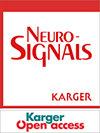Inhibition of Acid Sphingomyelinase by Antidepressants Counteracts Stress-Induced Activation of P38-Kinase in Major Depression
Q1 Medicine
引用次数: 18
Abstract
Background/Aims: Major depressive disorder is a common disease with serious morbidity, including increased risk of death from suicide. Major depressive disorder is treated with antidepressants. However, the molecular targets of antidepressants remained ill-defined and require further elucidation. Methods: Mice were treated with corticosterone to induce stress, amitriptyline and the p38-kinase (p38K) inhibitor SB239063 or a combination of these drugs. Phosphorylation of p38K in hippocampal neurons was determined by immunostaining with a phospho-specific antibody, neuronal proliferation using BrdU-labelling and behaviour employing a set of behavioural tests. Results: Corticosterone induced phosphorylation/activation of p38K in the hippocampus in vivo. Antidepressants reversed the effect of corticosterone on p38K activation in wildtype mice, but had no effect in acid sphingomyelinase-deficient animals. Corticosterone also reduced neurogenesis and triggered depression-like behavioural changes, effects that were prevented by pharmacological inhibition of p38K. Conclusion: Stress induces p38K phosphorylation/activation in the hippocampus and thereby reduces neurogenesis and induces depression-like symptoms, events that are prevented by antidepressants via inhibition of the acid sphingomyelinase/ceramide system.抗抑郁药物对酸性鞘磷脂酶的抑制作用可抵消应激诱导的重性抑郁症患者p38激酶的激活
背景/目的:重度抑郁症是一种常见疾病,发病率高,包括自杀死亡风险增加。重度抑郁症用抗抑郁药治疗。然而,抗抑郁药的分子靶点仍然不明确,需要进一步阐明。方法:小鼠分别用皮质酮、阿米替林、p38激酶(p38K)抑制剂SB239063或联合用药诱导应激。通过磷酸化特异性抗体的免疫染色、brdu标记的神经元增殖和一组行为测试的行为来确定海马神经元中p38K的磷酸化。结果:皮质酮诱导海马p38K磷酸化/激活。抗抑郁药逆转了皮质酮对野生型小鼠p38K激活的影响,但对酸性鞘磷脂酶缺乏的动物没有影响。皮质酮还能减少神经发生,并引发类似抑郁的行为改变,而这种影响可以通过药物抑制p38K来预防。结论:应激诱导海马p38K磷酸化/激活,从而减少神经发生,诱发抑郁样症状,而抗抑郁药通过抑制酸性鞘磷脂酶/神经酰胺系统来预防这些事件。
本文章由计算机程序翻译,如有差异,请以英文原文为准。
求助全文
约1分钟内获得全文
求助全文
来源期刊

Neurosignals
医学-神经科学
CiteScore
3.40
自引率
0.00%
发文量
3
审稿时长
>12 weeks
期刊介绍:
Neurosignals is an international journal dedicated to publishing original articles and reviews in the field of neuronal communication. Novel findings related to signaling molecules, channels and transporters, pathways and networks that are associated with development and function of the nervous system are welcome. The scope of the journal includes genetics, molecular biology, bioinformatics, (patho)physiology, (patho)biochemistry, pharmacology & toxicology, imaging and clinical neurology & psychiatry. Reported observations should significantly advance our understanding of neuronal signaling in health & disease and be presented in a format applicable to an interdisciplinary readership.
 求助内容:
求助内容: 应助结果提醒方式:
应助结果提醒方式:


